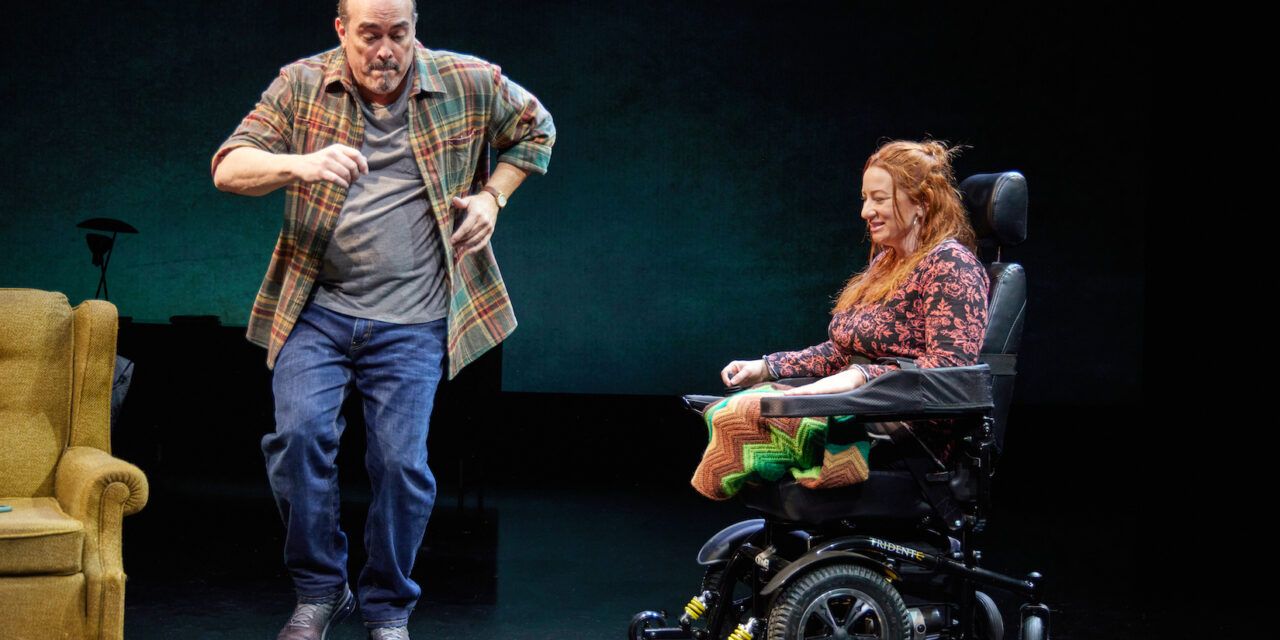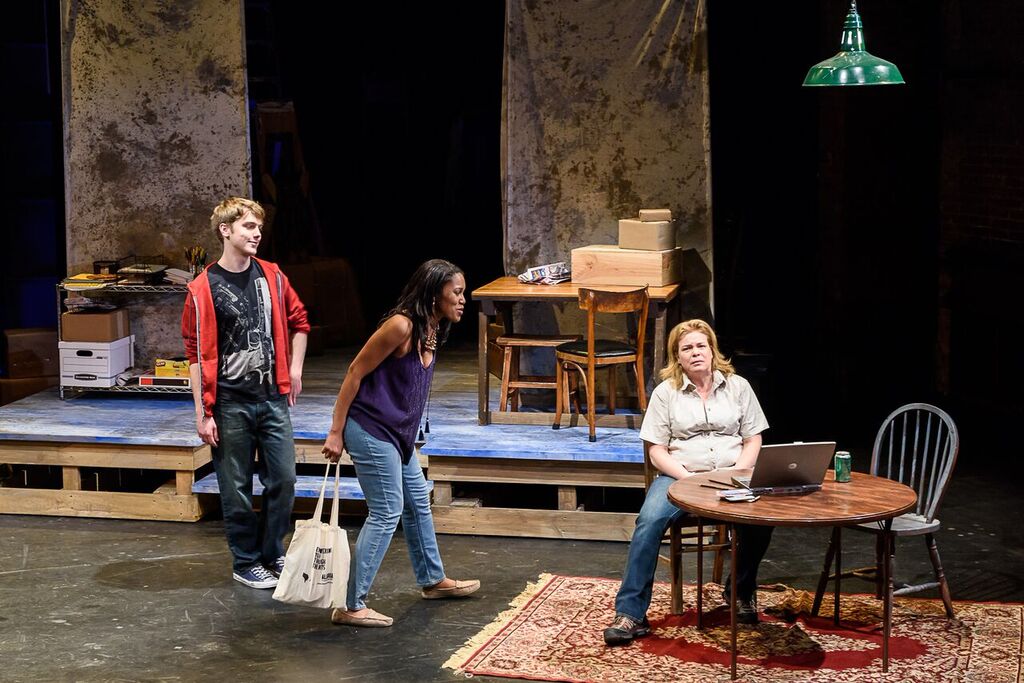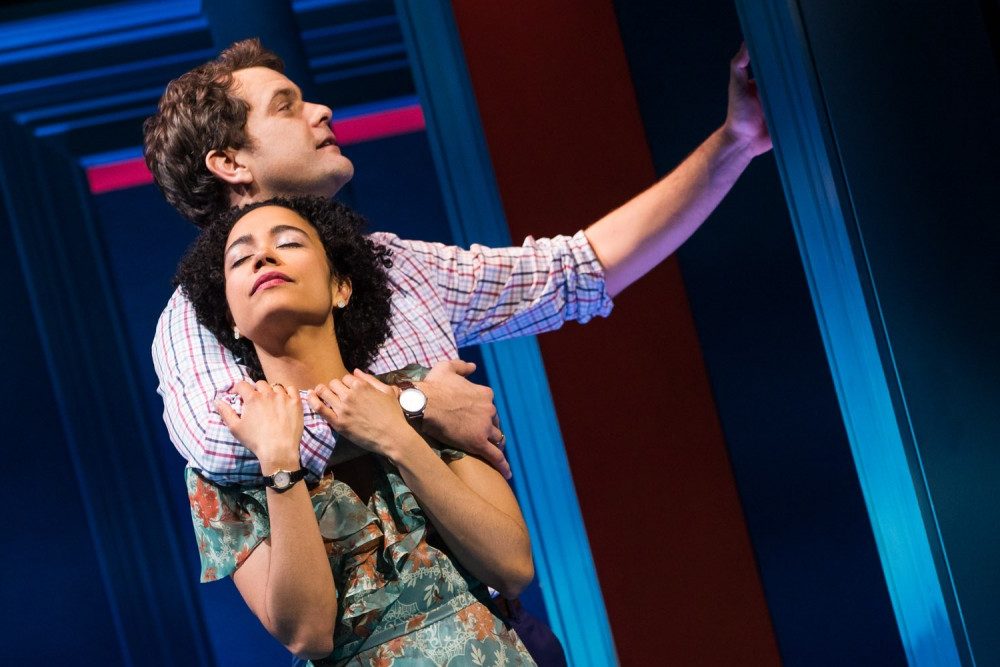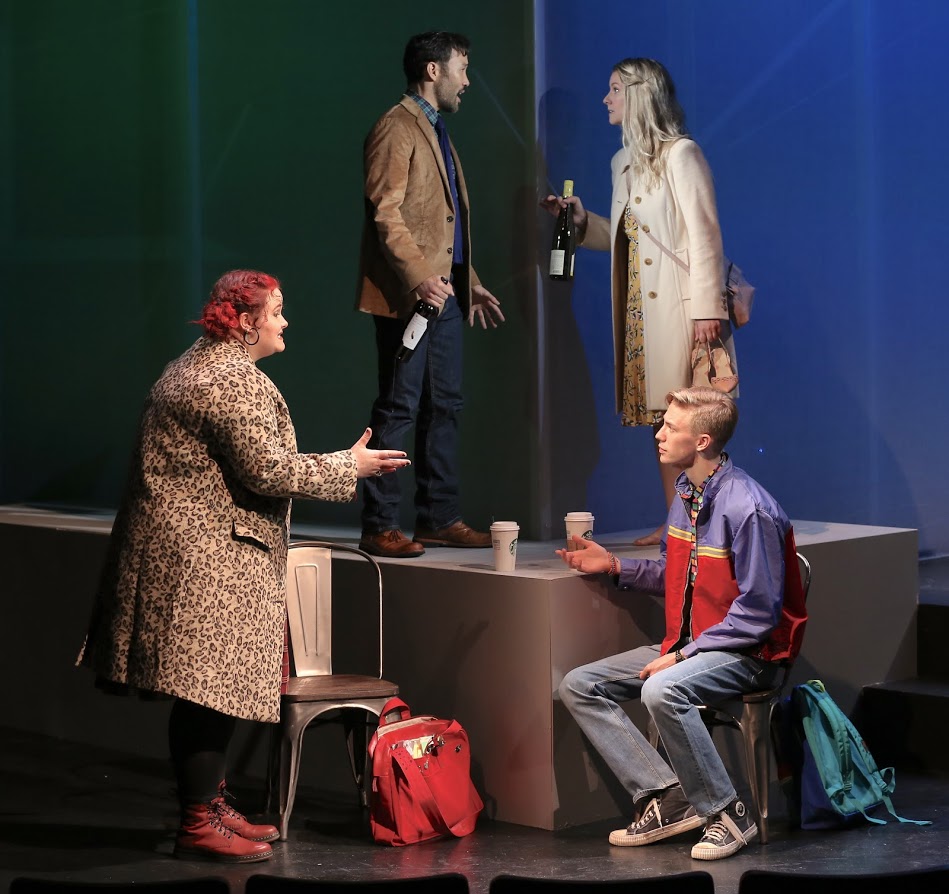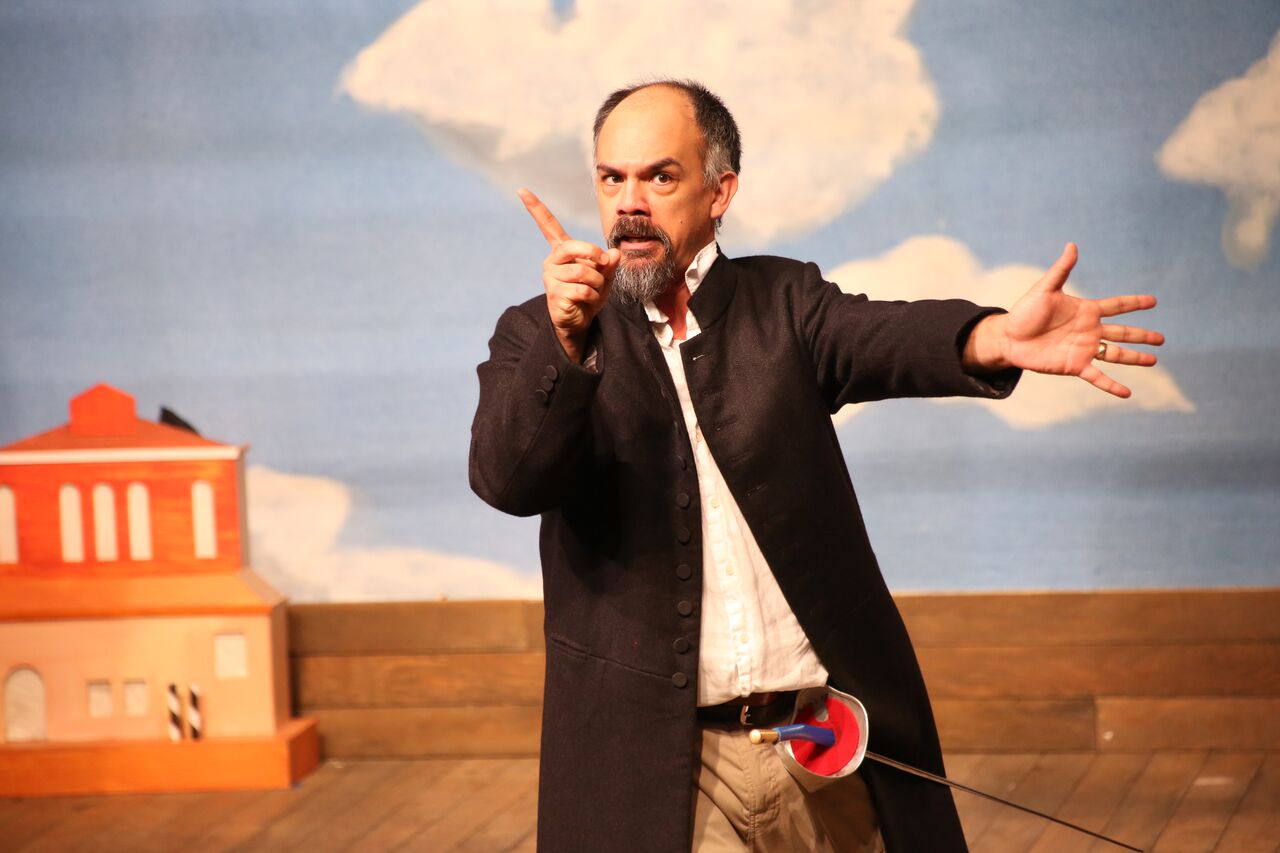EXTENDED THRU NOVEMBER 6
By Samuel L. Leiter . . .
Cost of Living, Martyna Majok’s (Sanctuary City) sometimes touching and funny dramedy, which premiered in 2017 at the Williamstown Theatre Festival, was produced Off Broadway by the Manhattan Theatre Club in 2018, and won that year’s Pulitzer Prize for drama. It now has reached the MTC’s Broadway venue at the Samuel J. Friedman Theatre, where a wider audience can be exposed to its depiction of the mutual needs of people with disabilities and their caretakers.
Although two of the actors are different, director Jo Bonney’s production hews closely to the 2018 production, gripping the audience’s attention through much of its intermissionless hour and 40 minutes, but unable to prevent its well-meaning intentions from running into obstacles that seriously handicap the goodwill it seeks to generate. Many of the flaws apparent in 2018 seem, as encountered on a Broadway stage, even more prominent than before. Otherwise, what I wrote back then needs only a few adjustments for the new production, which—with the same design team—seems little altered from its last incarnation.
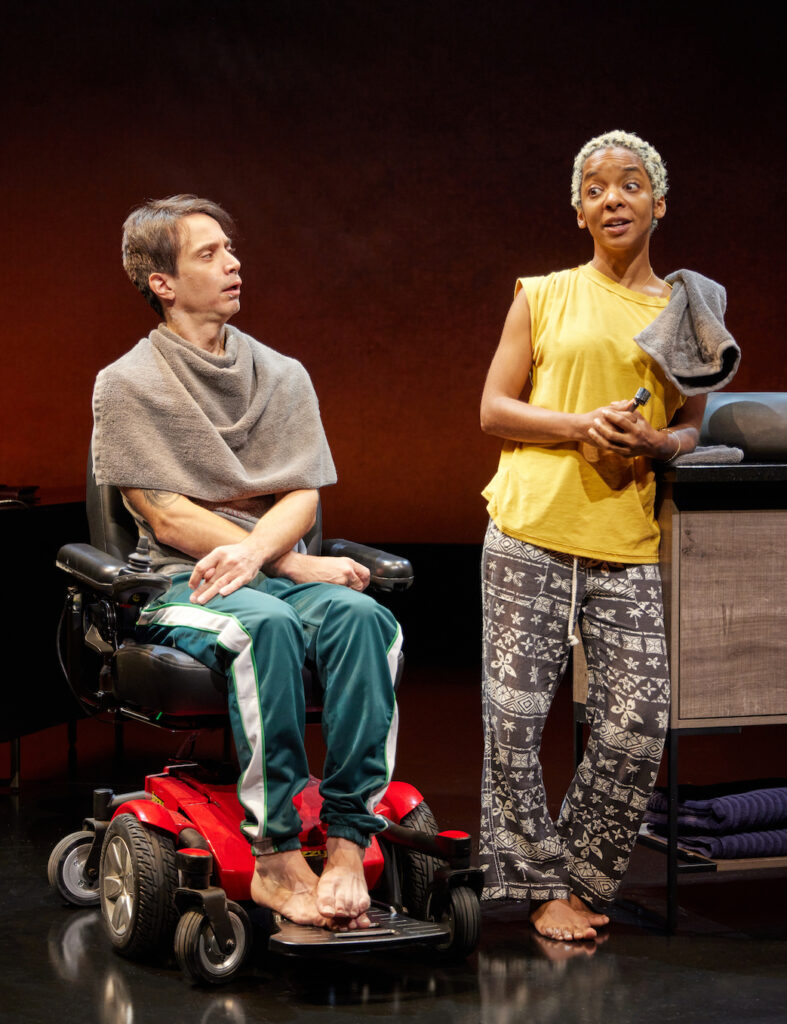
Cost of Living asks us to watch, like voyeurs, as two able-bodied characters lovingly minister to two disabled ones, played (as has become standard practice) by actors with real disabilities. Perhaps we even wonder how we ourselves would function in the same situations. But for all the emotional and physical expressiveness of the actors, and the interest conveyed by the characters’ relationships and often funky dialogue, the play remains basically a series of situations in search of a plot.
It begins with a prologue set in a hip Williamsburg, Brooklyn bar around Christmastime with an out-of-work, depressed, middle-aged, unemployed trucker named Eddie Torres (David Zayas, Dexter) delivering a lengthy monologue to an invisible stranger—for which we serve as substitutes—about why he’s driven here from his home in Bayonne, NJ. Lonely for his recently deceased wife, Ani, he’s been sending texts to her old number; someone, like a ghost (a more mundane explanation will be forthcoming), has invited the lonely guy here to meet her.
This provides the exposition for the flashback tale of Eddie, Ani (Katy Sullivan, who has been with the show since its first production), and their on-the-rocks marriage. But before we get there, we’re introduced to a parallel story concerning John (Gregg Mozgala, Richard III, back from the 2018 version), a good-looking, wealthy, Princeton doctoral student confined by cerebral palsy to a motorized wheelchair. John interviews and hires Jess (Kara Young, Clyde’s), an attractive, young, bartender of color, uncomfortable talking about her past. She has a Princeton degree but the play never clarifies why she’s so poor or why she so ignorantly refers to John as “differently abled,” among other holes in her backstory.
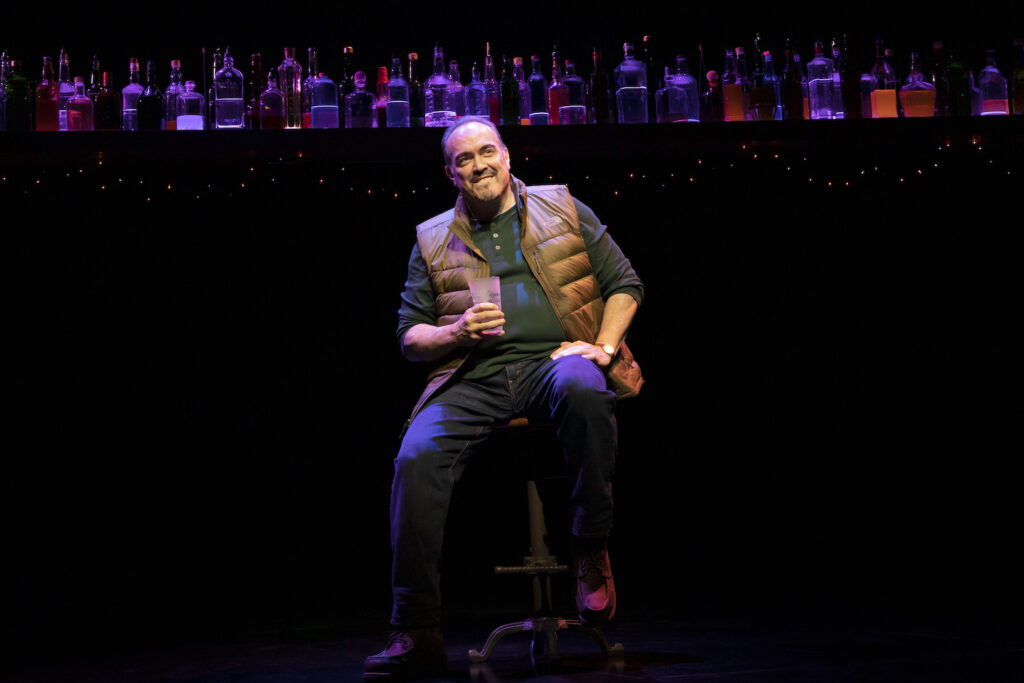

As Mikaal Sulaiman’s mood-setting music plays during the shifts, Wilson Chin’s turntable set, elegantly lit by Jeff Croiter, smoothly brings us to and from John’s upscale—albeit sparsely depicted—apartment and Ani’s more mundane one, basically a shabby, beige wall and chair. At John’s place, we watch the growing friendship between the irritatingly questioning John and the determinedly compliant Jess, which, for all its quarrelsome tension, seems headed in a romantic direction.
At Ani’s we observe the attempts of Eddie, who’s been involved with another woman, to reconcile with Ani, his estranged wife of nearly 21 years. She’s a wheelchair-bound quadriplegic suffering from a spinal injury experienced in a car crash. (Sullivan, a U.S. Paralympics medalist, was born with no legs beneath the knees; one wonders why the script doesn’t jibe with the actress’s own disability.) Eddie, possibly seeking to make up for a guilty conscience, insists he’d be a better caretaker than a hired nurse. Given the loving, even self-abasing nature of his reactions to Ani’s nastily derogatory treatment of him, it’s hard to see why—despite her now understandable anger—he bothered to cheat on her in the first place.
Cost of Living’s most memorable scenes involve remarkably intimate bathroom scenes, with Jess attending to John’s shaving and showering needs, and Eddie washing Ani as she reclines in a freestanding tub. Jess’s professional, businesslike movements, especially when she dresses and undresses John, all the while chatting as if she were engaged in any average household activity, like cooking a meal or washing dishes, contrast with the tender, potentially erotic attentions of Eddie, leaning over the tub. Ani’s response to his touch is a moving account of how she compensates for her lack of feeling by depending on her imagination.
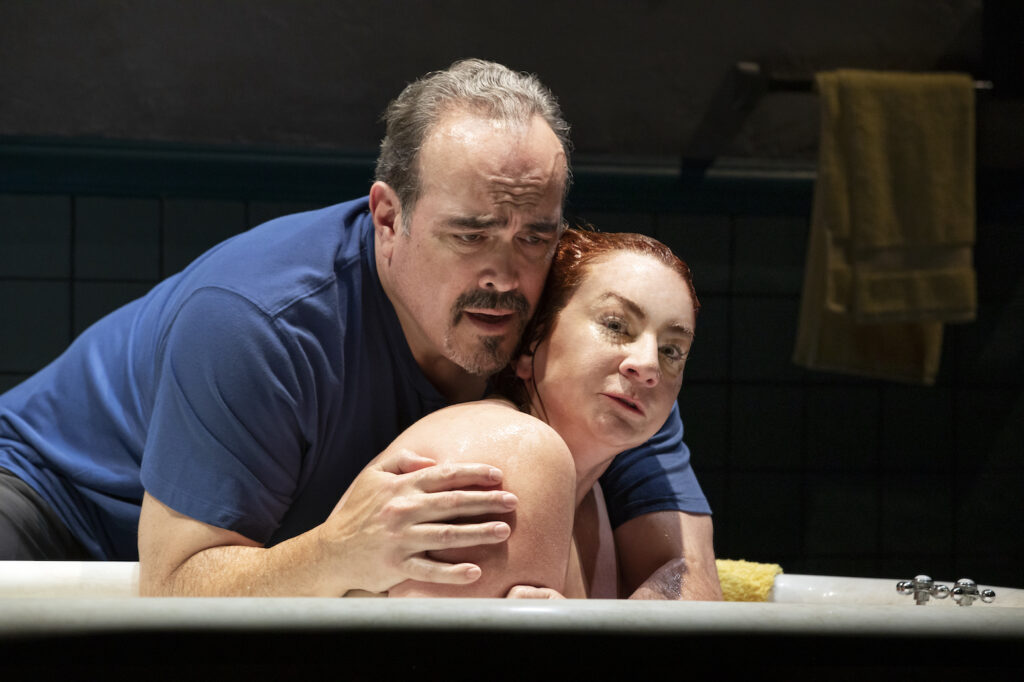

But, as shockingly demonstrated when Eddie briefly leaves her alone, Ani’s disability is such that the question arises as to why she doesn’t have someone with her 24/7. John, though a bit more mobile, also seems to have such a need. Ani’s emergency button might bring help to her in an emergency, but how does she eat or use the bathroom when no one else is around? With no other characters available, the play fails to address these issues.
Also problematic are the scenes related to a prospective date between Jess and John, for which she gets all dolled up (by costumer Jessica Pabst) in a form-fitting lavender dress. The writing is contrived to surprise the audience by showing John unsympathetically. All well and good, but, given the setup when John invites her over, even though it means her giving up a bartending shift, it seems—especially on a second viewing—an awkwardly artificial device that makes John more oblivious than he’s thus far seemed, simply for dramatic effect, like many of the play’s other confrontational moments.
In the final scene, when Majok attempts to bring both story lines together, Jess seems especially out of character, and the ending is disappointingly awkward. Dramatic surprises are always welcome, but they shouldn’t seem forced or arbitrary.
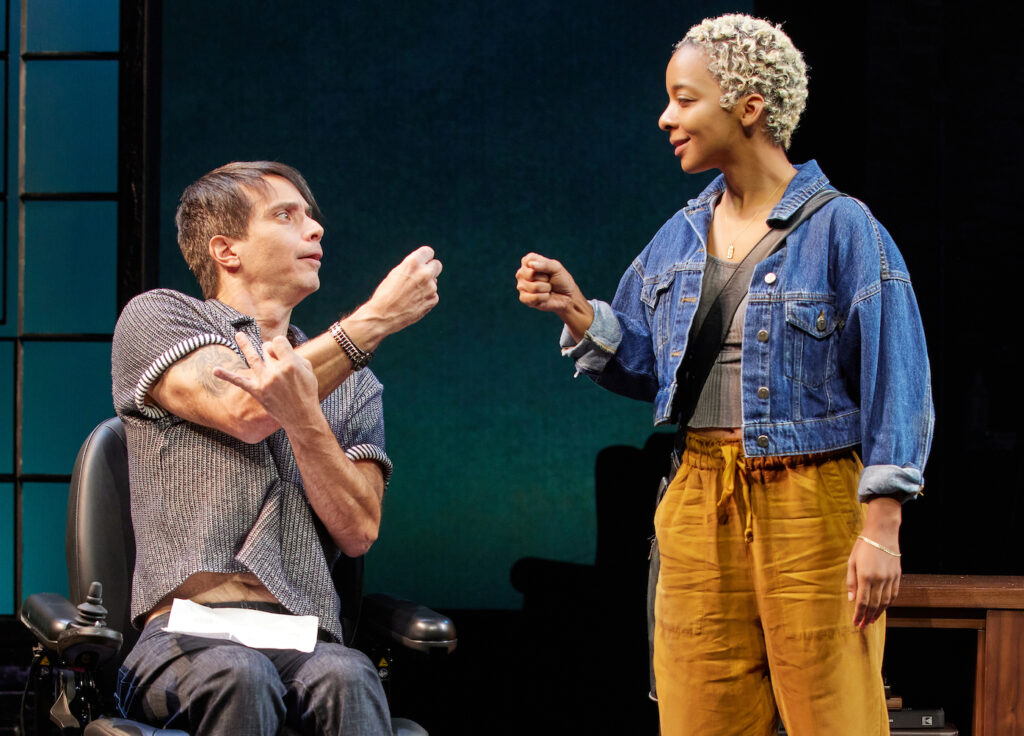

Majok’s vivid dialogue, thoroughly seeded with profanities, is engaging, if a bit floridly expressive. David Zayas’s Eddie is, like his predecessor in the role, Victor Williams, a gentle, voluble, everyday sweetheart of a lug, although he has to use such strained, working-class locutions as “You ain’t die.” Kara Young, like Jolly Abraham before her, captures Jess’s determination, as well as the protective force field she projects, making the scene of her big disappointment especially affecting. Gregg Mozgala is believable as the annoyingly egocentric John until the writing makes him less so. The redheaded Sullivan stands out, using her nasal, high-pitched, Jersey accent to shoot a stream of verbal bullets at Eddie, expressing both her sadness and anger, her love and disdain, while repeatedly calling him a prick.
Majok’s title seems, on the one hand, to refer to the financial costs of living with a disability, contrasting John’s wealth with Ani’s dependence on Eddie’s insurance. It also suggests the economic hardships represented by Jess’s itinerant bartending and Eddie’s unemployment. Its metaphoric implications, however, about the emotional and psychological costs incurred in codependent relationships, are perhaps its biggest takeaway.
Cost of Living. Through October 30 at the Samuel J. Friedman Theatre (261 West 47th Street, between Seventh and Eighth Avenue). One hour, 40 minutes, no intermission. www.manhattantheatreclub.com
Photos: Jeremy Daniel


